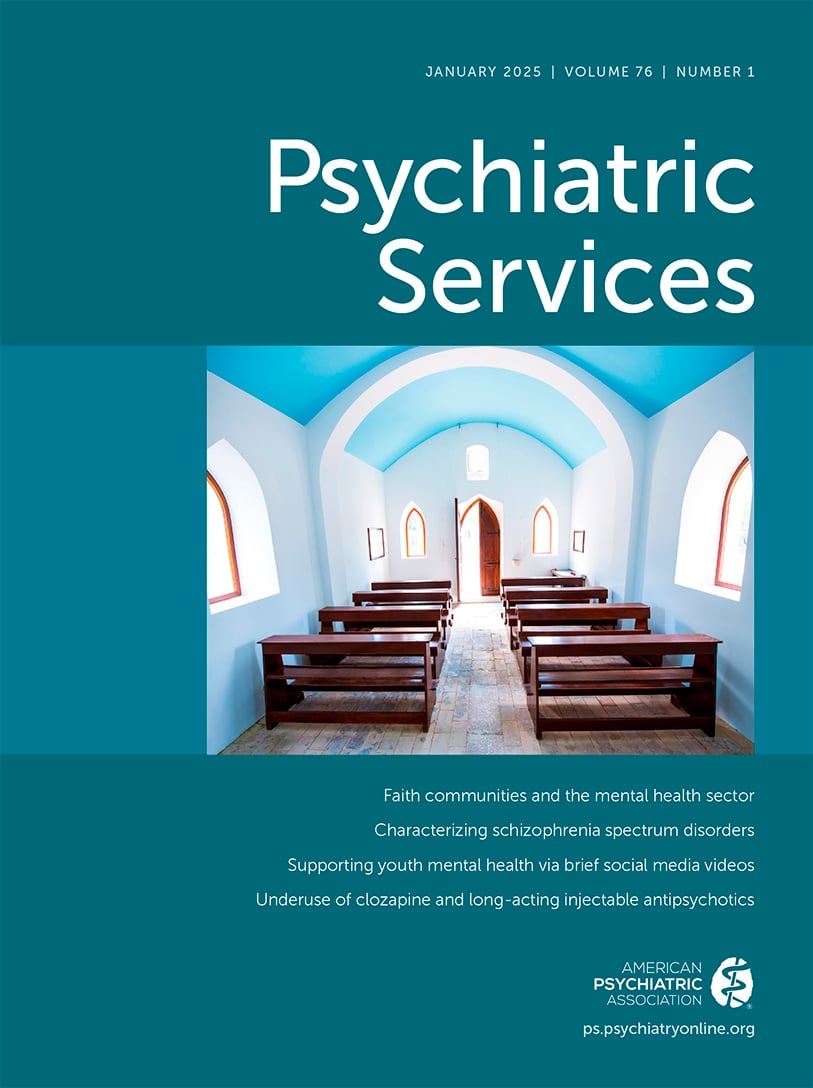Psychiatric Services
- Volume 48
- Number 10
- October 1997
Article
Publication date: 01 October 1997
Pages1273–1282OBJECTIVE: Women with severe mental illness were surveyed to explore issues in living with mental illness, personal relationships, and professional relationships and health care. The topics were drawn from the literature on the psychology of women and ...
https://doi.org/10.1176/ps.48.10.1273Publication date: 01 October 1997
Pages1283–1288OBJECTIVES: The study evaluated the relative impact of HIV risk reduction interventions for adults with severe mental illness living in the inner city. METHODS: A total of 104 chronically mentally ill men and women were interviewed to determine sexual ...
https://doi.org/10.1176/ps.48.10.1283Publication date: 01 October 1997
Pages1289–1296OBJECTIVES: This study examined the impact of regulations established by the Omnibus Budget Reconciliation Act of 1987 (OBRA-87) on prescriptions for psychotropic drugs, and on research on their use in nursing homes. METHODS: Data were collected on drugs ...
https://doi.org/10.1176/ps.48.10.1289Publication date: 01 October 1997
Pages1297–1306OBJECTIVE: Two assertive community treatment teams were compared with a usual-care control condition based on their ability to engage and retain clients with serious and persistent mental illness in community- based mental health services. METHODS: ...
https://doi.org/10.1176/ps.48.10.1297Publication date: 01 October 1997
Pages1307–1310OBJECTIVE: The study examined a 95-bed locked community facility (an institute for mental disease), one of 40 such facilities in California to which patients with increasingly difficult problems in management have been referred over the past few years as ...
https://doi.org/10.1176/ps.48.10.1307Publication date: 01 October 1997
Pages1311–1316OBJECTIVE: This study sought to determine the impact of a formal screening program for substance use disorders among psychiatric inpatients. Both identification of these disorders and referrals to aftercare were measured. METHODS: A total of 193 patients ...
https://doi.org/10.1176/ps.48.10.1311Publication date: 01 October 1997
Pages1317–1322OBJECTIVE: The objectives of this study were to develop a measure to assess patients' response to civil commitment, to test this measure on two groups of dually diagnosed patients (medically ill alcoholics and patients with dual mental and substance use ...
https://doi.org/10.1176/ps.48.10.1317Publication date: 01 October 1997
Pages1323–1327OBJECTIVE: To make clinically relevant recommendations for electrocardiogram (ECG) testing among psychiatric patients, the study examined the practice of ordering ECGs for this population. METHODS: The records of 4,045 patients consecutively admitted for ...
https://doi.org/10.1176/ps.48.10.1323Publication date: 01 October 1997
Pages1328–1330Ethnic and racial differences in the stigma associated with mental illness in the general population were examined through secondary analysis of data from a survey of a nationally representative sample (N = 1,468) on attitudes toward homeless and homeless ...
https://doi.org/10.1176/ps.48.10.1328Publication date: 01 October 1997
Pages1331–1333Among 100 participants in a Department of Veterans Affairs domiciliary program for chronic mentally ill homeless veterans who were consecutively referred for psychiatric consultation, 81 who were not psychotic and did not have central nervous system ...
https://doi.org/10.1176/ps.48.10.1331Publication date: 01 October 1997
Pages1334–1335The authors present three case vignettes in which inpatients with schizophrenia participated in psychotherapy sessions that included three phases: traditional verbal psychotherapy, computer-facilitated therapy, and recapitulation of the session. In the ...
https://doi.org/10.1176/ps.48.10.1334Publication date: 01 October 1997
Pages1336–1338Staff who provide services for persons with severe mental illness often have pessimistic attitudes about adopting behavioral innovations for their programs. Thirty-five staff members in psychiatric residential programs participated in eight months of ...
https://doi.org/10.1176/ps.48.10.1336Article
Past Issues
View Issues Archive
Vol. 76 | No. 1

Vol. 75 | No. 12

Vol. 75 | No. 11
